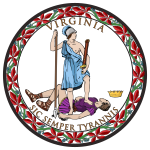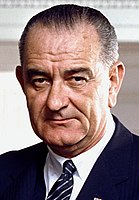| ||||||||||||||||||||||||||
| ||||||||||||||||||||||||||
 County and Independent City Results
| ||||||||||||||||||||||||||
| ||||||||||||||||||||||||||
| Elections in Virginia |
|---|
 |
The 1964 United States presidential election in Virginia took place on November 3, 1964. All 50 states and the District of Columbia were part of the 1964 United States presidential election. Virginia voters chose 12 electors to the Electoral College, which selected the president and vice president of the United States.
For the previous six decades Virginia had almost completely disenfranchised its black and poor white populations through the use of a cumulative poll tax and literacy tests.[1] So restricted was suffrage in this period that it has been calculated that a third of Virginia's electorate during the first half of the twentieth century comprised state employees and officeholders.[1]
This limited electorate allowed Virginian politics to be controlled for four decades by the Byrd Organization, as progressive “antiorganization” factions were rendered impotent by the inability of almost all their potential electorate to vote.[2] Historical fusion with the “Readjuster” Democrats,[3] defection of substantial proportions of the Northeast-aligned white electorate of the Shenandoah Valley and Southwest Virginia over free silver,[4] and an early move towards a “lily white” Jim Crow party[3] meant Republicans retained a small but permanent number of legislative seats and local offices in the western part of the state.[5]
In 1928, the GOP did carry the state's presidential electoral votes due to anti-Catholicism against Al Smith, but it was 1952 before any real changes occurred, as in-migration from the traditionally Republican Northeast[6] meant that growing Washington, D.C., and Richmond suburbs would turn Republican not just in presidential elections but in Congressional ones as well,[7] although the Republicans would not make significant gains in the state legislature. Opposition to the black civil rights legislation of Harry S. Truman meant that the Byrd Organization did not support Adlai Stevenson II or John F. Kennedy.[8] Although the Organization viewed the national Republican party as no better on civil rights—it opposed the “massive resistance” orchestrated by Senator Byrd after Brown v. Board of Education—Byrd's silence helped Eisenhower and Nixon win the state three consecutive times between 1952 and 1960.
For 1964, it was evident that Virginia's electorate would be substantially increased by the Twenty-fourth Amendment, which banned the poll tax in federal elections and allowed major increases in voter registration during the preceding year.[9] Efforts by civil rights groups to register black voters would help black voter registration double vis-à-vis 1960.[10] At the same time, Republican nominee Arizona Senator Barry Goldwater voted against the Civil Rights Act and targeted the South as critical to winning the election against incumbent President Lyndon B. Johnson who signed that Act in August 1964, whilst most Byrd Democrats endorsed Johnson—this being the first time since 1936 the Organization had done so.[10]
- ^ a b Kousser, J. Morgan. The Shaping of Southern Politics: Suffrage Restriction and the Establishment of the One-Party South, 1880-1910. Yale University Press. pp. 178–181. ISBN 0-300-01696-4.
- ^ Key, Valdimer Orlando (1949). Southern Politics in State and Nation. pp. 20–25.
- ^ a b Heersink, Boris; Jenkins, Jeffrey A. Republican Party Politics and the American South, 1865-1968. pp. 217–221. ISBN 1107158435.
- ^ Moger, Allen. "The Rift in Virginia Democracy in 1896". The Journal of Southern History. 4 (3): 295–317.
- ^ Phillips, Kevin P.; The Emerging Republican Majority, pp. 210, 242 ISBN 978-0-691-16324-6
- ^ Heinemann, Ronald L. (2008). Old Dominion, New Commonwealth: A History of Virginia, 1607-2007. Charlottesville: University of Virginia Press. p. 357. ISBN 0813927692.
- ^ Atkinson, Frank B. (2006). The Dynamic Dominion: Realignment and the Rise of Two-party Competition in Virginia, 1945-1980. Rowman & Littlefield. ISBN 9780742552098.
- ^ Ely, James W. (1976). The Crisis of Conservative Virginia: the Byrd Organization and the Politics of Massive Resistance. Knoxville, Tennessee: University of Tennessee Press. p. 16. ISBN 0870491881.
- ^ Sweeney, James R. (1994). "A New Day in the Old Dominion". Virginia Magazine of History and Biography. 102 (3): 307–348.
- ^ a b Davidson, Chandler; Grofman, Bernard (1994). Quiet revolution in the South: the impact of the Voting rights act, 1965-1990. pp. 275–276. ISBN 0691032475.

